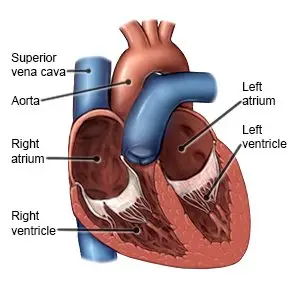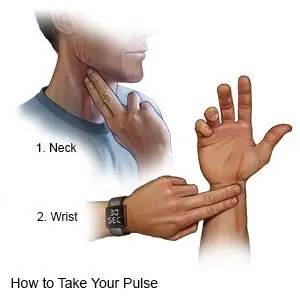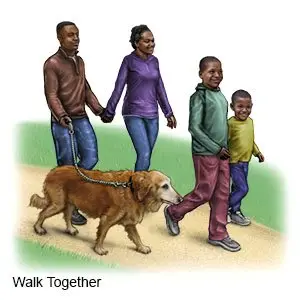What is atrial tachycardia?
Atrial tachycardia is a condition that causes your heart to beat more than 100 times each minute. Atrial tachycardia is also called supraventricular tachycardia. It can develop because of problems with your heart's electrical system.
 |
What increases my risk for atrial tachycardia?
Any of the following can increase your risk for atrial tachycardia:
- A heart condition, hypertension, or fatigue
- Anxiety, stress, or pain
- Large amounts of caffeine from coffee, tea, and energy drinks
- Heavy alcohol use, cigarette smoking, or drugs such as cocaine
- Certain medicines, such as some heart medicines, bronchodilators, and decongestants
What are the signs and symptoms of atrial tachycardia?
Atrial tachycardia may happen without other symptoms. You may feel any of the following:
- Lightheaded, dizzy, or faint
- Jumping or fluttering in your chest
- New or increased shortness of breath
- Pain, pressure, or tightness in your chest
How is atrial tachycardia treated?
You may need treatment if your atrial tachycardia continues or comes and goes. You may need medicine, procedures, or surgery. Your healthcare provider may send you to a cardiologist for other tests.
Treatment options
The following list of medications are in some way related to or used in the treatment of this condition.
- verapamil
- adenosine
How do I check my heart rate (pulse)?
Your healthcare provider will show you how to check your pulse, and how often to check it. Write down how fast your pulse is and if it feels regular or like it is skipping beats. Also write down the activity you were doing if your heart rate is above 100. Bring the information with you to your follow-up appointment.
 |
How can I prevent or manage atrial tachycardia?
- Talk to your healthcare provider about all your current medicines. He or she may change a medicine if it is causing your fast heart rate. Do not stop taking any medicine unless directed by your provider.
- Have less caffeine. Caffeine can increase your heart rate.
- Limit or do not drink alcohol. Alcohol can increase your heart rate. Ask your healthcare provider if it is okay for you to drink any alcohol. He or she can help you set limits for the number of drinks you have in 24 hours and in a week. A drink of alcohol is 12 ounces of beer, 5 ounces of wine, or 1½ ounces of liquor.
- Do not smoke. Nicotine and other chemicals in cigarettes can cause damage to your heart. Ask your healthcare provider for information if you currently smoke and need help to quit. E-cigarettes or smokeless tobacco still contain nicotine. Talk to your healthcare provider before you use these products.
- Do not use illegal drugs. Drugs such as meth and cocaine can increase your heart rate. Talk to your healthcare provider if you use illegal drugs and need help to quit.
- Get more rest. Fatigue can cause your heart rate to increase.
- Eat heart-healthy foods. These include fruits, vegetables, whole-grain breads, low-fat dairy products, beans, lean meats, and fish. Replace butter and margarine with heart-healthy oils such as olive oil and canola oil.

- Exercise regularly and maintain a healthy weight. Ask about the best exercise plan for you. Ask your healthcare provider what a healthy weight is for you. Ask him or her to help you create a safe weight loss plan if you are overweight.

- Learn ways to cope with stress. Stress, fear, and anxiety can cause a fast heart rate. Your healthcare provider may recommend relaxation techniques and deep breathing exercises. Your healthcare provider may recommend you talk to someone about your stress or anxiety, such as a counselor or a trusted friend.
Call your local emergency number (911 in the US) or have someone call if:
- You have any of the following signs of a heart attack:
- Squeezing, pressure, or pain in your chest
- You may also have any of the following:
- Discomfort or pain in your back, neck, jaw, stomach, or arm
- Shortness of breath
- Nausea or vomiting
- Lightheadedness or a sudden cold sweat
- You cannot be woken.
When should I call my doctor?
- Your pulse is faster than you were told it should be.
- You have a fast heart rate often.
- You feel weak or dizzy.
- You have questions or concerns about your condition or care.
Care Agreement
You have the right to help plan your care. Learn about your health condition and how it may be treated. Discuss treatment options with your healthcare providers to decide what care you want to receive. You always have the right to refuse treatment. The above information is an educational aid only. It is not intended as medical advice for individual conditions or treatments. Talk to your doctor, nurse or pharmacist before following any medical regimen to see if it is safe and effective for you.© Copyright Merative 2023 Information is for End User's use only and may not be sold, redistributed or otherwise used for commercial purposes.




